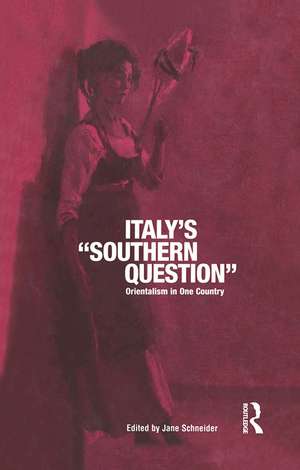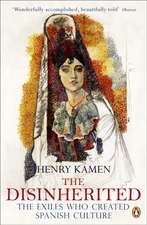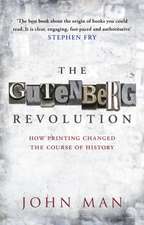Italy's 'Southern Question': Orientalism in One Country
Editat de Jane Schneideren Limba Engleză Paperback – mar 1998
| Toate formatele și edițiile | Preț | Express |
|---|---|---|
| Paperback (1) | 280.29 lei 3-5 săpt. | +19.10 lei 4-10 zile |
| Taylor & Francis – mar 1998 | 280.29 lei 3-5 săpt. | +19.10 lei 4-10 zile |
| Hardback (1) | 1006.92 lei 6-8 săpt. | |
| Taylor & Francis – mar 1998 | 1006.92 lei 6-8 săpt. |
Preț: 280.29 lei
Nou
Puncte Express: 420
Preț estimativ în valută:
53.63€ • 56.14$ • 44.64£
53.63€ • 56.14$ • 44.64£
Carte disponibilă
Livrare economică 10-24 martie
Livrare express 21-27 februarie pentru 29.09 lei
Preluare comenzi: 021 569.72.76
Specificații
ISBN-13: 9781859739976
ISBN-10: 1859739970
Pagini: 308
Ilustrații: index
Dimensiuni: 155 x 233 x 16 mm
Greutate: 0.36 kg
Ediția:1
Editura: Taylor & Francis
Colecția Routledge
Locul publicării:Oxford, United Kingdom
ISBN-10: 1859739970
Pagini: 308
Ilustrații: index
Dimensiuni: 155 x 233 x 16 mm
Greutate: 0.36 kg
Ediția:1
Editura: Taylor & Francis
Colecția Routledge
Locul publicării:Oxford, United Kingdom
Cuprins
Acknowledgments, Introduction: The Dynamics of Neo-orientalism in Italy (1848-1995), 1. Before the Southern Question: "Native" Ideas on Backwardness and Remedies in the Kingdom ofTwo Sicilies, 1815-1849, 2. The Emergence of the Southern Question in Villari, Franchetti, and Sonnino, 3. How Many Italies? Representing the South in Official Statistics, 4. Biology or Environment? Race and Southern "Deviancy" in the Writings of Italian Criminologists, 1880-1920, 5. Homo Siculus: Essentialism in the Writing of Giovanni Verga, Giuseppe Tomasi di Lampedusa, and Leonardo Sciascia, 6. The Souths of Antonio Gramsci and the Concept of Hegemony, 7. How Critical Was De Martino's "Critical Ethnocentrism" in Southern Italy?, 8. The Magic of the South: Popular Religion and Elite Catholicism in Italian Ethnology, 9. Casting Off the "Southern Problem": Or the Peculiarities of the South Reconsidered, 10. "Virtuous Clientelism": The Southern Question Resolved?, 11. IL Caso Sciascia: Dilemmas of the Antimafia Movement in Sicily, 12. Re-writing Sicily: Postmodern Perspectives, 13. Contemplating the Palm Tree Line, 14. Two Italies: Rhetorical Figures of Failed Nationhood, Notes on Contributors, Index
Notă biografică
Jane Schneider Professor of Anthropology,Graduate and University Center, City University of New York
Descriere
The ‘Southern Question' has been a major topic in Italian political, economic and cultural life for a century and more. During the Cold War, it was the justification for heavy government intervention.













